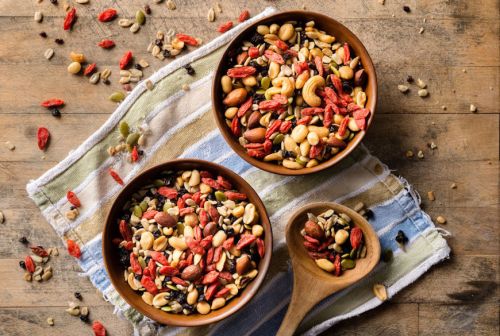Our editors independently select these products. Making a purchase through our links may earn Well+Good a commission
10 reasons why you should consider making goji berries your go-to oatmeal and smoothie bowl topper
See a roundup of goji berry benefits, learn possible side effects, and see ways to add more goji berries to your everyday diet.

Every once in a while, a healthy food will start popping up on the menus at juice bars and nutritious eateries and the rise to notoriety will be so quick, it’s suddenly everywhere before most people even know what the heck it is. In 2013, it happened with chia seeds. Now, it’s happening with goji berries.
Native to China, goji berries (also called Chinese wolfberries) grow on small, thorny shrubs. Cousin to the tomato (and a member of the nightshade family), the goji berry blossoms into a vibrant reddish orange. Slightly sweet—and a bit sour—goji berries are as brimming with health benefits as they are color and taste. Rounded up here are ten benefits to incorporating the antioxidant-rich berries into your diet—along with ideas of what to do with them.
Here’s what you need to know about goji berry benefits and how to enjoy them at home.

First, a caveat with goji berry benefits: They need more research. Most studies (as you’ll see in a sec) were either small human trials, or were performed on rats—meaning that their results are not necessarily conclusive.
This is important to know given that people can get pretty extra about the plant. It was so bad when they first hit the market that the FDA had to issue warning letters to several companies selling goji berry products because they were making exaggerated or unproven claims about the fruit’s benefits.
That said, goji berries do have a long history of being used in traditional Chinese Medicine, and just because Western science hasn’t caught up on the research side doesn’t mean that they’re total B.S. Rather, think of the below goji berry benefits more as potential perks you can get from eating them, rather than something that’s set in stone.
1. Goji berries might help boost liver health.
According to an article published in the journal Herbal Medicine, goji berries may help support the liver. “It functions in this capacity by preventing bacteria and viruses from attaching to cell membranes on the liver and other organs, thereby stopping infections from becoming established,” the authors wrote. One older study on rats also found that goji berries protected the liver against free radicals, primarily because of the high amount of antioxidants. Promising!
2. They could help with dry eyes.
Consuming goji berries on a regular basis could also keep your eyesight strong. (Yes, you, who is staring at a screen 14 hours a day!) One study, again done on rats, found that goji berries helped reverse the effects of dry eye disease. Scientists credit this to their antimicrobial and anti-inflammatory qualities. “Goji berries are a safe food supplement with substantial benefits that ameliorate the symptoms of dry eye disease by enhancing the tear volume and repairing the damaged ocular surface cells,” the study authors wrote. Best tasting medicine ever?
3. They may help you nail your workout.
Goji berries could be the perfect pre-workout snack. One very small study found that participants who consumed the fruit regularly (in juice form) reported increased energy and better athletic performance. They also said they were able to focus more. Hey, maybe that’s all it takes to nail the complicated steps in your dance cardio class—more goji berries!
4. They’re probably good for your immune system.
All those antioxidants in goji berries can really work to give your immune system a boost, too. One study found that they helped older mice fight against the flu more effectively than those who just got a flu vaccine. So if you find yourself feeling under the weather, it might be worth it to add some goji berry powder to your morning smoothie.
5. They support healthy weight loss.
One small study found that eating 14 grams of goji berries a day supports a healthy metabolism and can lead to weight loss. “A significant reduction in abdominal fat was observed as evidenced by the reduction in waist circumference with an improvement in the lipid profile of the volunteers who received daily [gobi berries],” the findings read. Researchers write that the antioxidants in goji berries likely helped lower oxidative stress, which in turn contributed to weight loss.
6. They’re full of polyphenols.
Besides antioxidants, goji berries are loaded with polyphenols, active compounds that help fight off free radicals and lower inflammation. Pair your goji berries with some dark cacao for dessert and you’ll be really reaping the polyphenol rewards!
7. They may help stabilize blood sugar.
One small study found that taking goji berries supplements helped decreased blood glucose levels in people with type 2 diabetes. “The present study shows that [goji berries are] a potentially good treatment aided-agent for type 2 diabetes,” it concluded. Consider it your new stash-in-your-desk emergency snack.
8. They can protect against age-related diseases.
Eating goji berries on a regular basis can slow signs of aging, including age-related diseases such as dementia, according to an article in the journal Cellular and Molecular Neurobiology. The researchers point to polysaccharide, a carbohydrate in goji berries that helps lower inflammation and reduce stress in the body, as a potential driver of this. That’s something that benefits the entire body—including the brain.
9. They could help with arthritis.
Because the antioxidants in goji berries help fight oxidative stress, they can help lessen pain and symptoms of arthritis. When scientists gave mice goji berry supplements, it increased the neuroplasticity in their joints. This preliminary research suggests yet another reason why goji berries are especially beneficial for athletes and the elderly.
10. They’re a good source of vitamin C.
Like many fruits, goji berries are full of vitamin C, a crucial antioxidant not only for keeping your immune system strong, but also for eyesight and heart health. So if you’re getting a little tired or relying on oranges and strawberries, goji berries can help keep you get that vitamin C, too.
Are there any downsides to eating goji berries?
There are so many great ways adding goji berries to your diet can benefit your overall health, but there is one thing to keep in mind. Goji berries can contain atropine, a toxic alkaloid linked to feeling dizzy, nauseated, or having blurred vision. Fortunately, scientists who tested goji berries found the levels of atropine were very low; not high enough to qualify as a toxic level. (Basically, you’d likely have to eat a ton of goji berries in order to potentially get sick.)
How to eat goji berries and reap all the benefits
Overall, goji berries sound pretty great, right? Now the big question: How can you reap all their sweet rewards? Goji berries are primarily sold as a powder. You can add a couple tablespoons to your morning smoothie, or even brew as a tea, which can be brewed hot or sipped cold.
Because they’re so popular, dried goji berries are popping up more and more in trail mixes and snack bars. You can also buy the dried kind and use them to top off your oatmeal or acai bowl. Of course if you don’t like their sour-sweet taste but want to enjoy all the benefits, you can also take a goji berry supplement (although that should be done with the OK of your doctor to make sure it doesn’t potentially interfere with any medications or other supplements you may be taking).
In short, goji berries have a lot of hype around them—but also a lot of potential. So if you’re ready to mix up your breakfast routine with some of these babies instead of your standard golden raisins, go for it. It might be a total game-changer.
Here are some smoothie recipes goji berries will taste great in. They also make a yummy dessert when paired with cacao, which is also good for you, BTW.
Sign Up for Our Daily Newsletter
Get all the latest in wellness, trends, food, fitness, beauty, and more delivered right to your inbox.
Got it, you've been added to our email list.










